Timeline: Struggle for Women's Equality in the UK
25 April 1649: Elizabeth Lilburne, Mary Overton and Katherine Chidley, presented a petition, signed by 10,000 people to the House of Commons calling for equal rights on the basis of "our creation in the image of God, and of an interest in Christ equal unto men, as also of a proportionable share in the freedoms of this commonwealth".
2 February 1745: Birth of Hannah More. After starting her own school, she published Essays on Various Subjects, Principally Designed for Young Ladies (1777). The eight essays dealt with topics such as education and religion. She suggested that schools should stress "the intellectual, sentimental, and religious education of girls" and argued that women were "one of the principal hinges on which the great machine of human society turns".
27 April 1759: The birth of Mary Wollstonecraft, the author of Vindication of the Rights of Women (1792).
12 November 1769: The birth of Amelia Opie. An opponent of slavery and supporter of parliamentary reform she published several novels including The Father and Daughter (1801) and Adeline Mowbray: Mother and Daughter (1804).
4 December 1769: The birth of Elizabeth Coltman Heyrick, a member of the Anti-Slavery Society and the author of Immediate not Gradual Abolition (1824).
10 March 1779: The birth of Frances Trollope, the author of Michael Armstrong: Factory Boy (1840) and campaigner against child labour.
21 May 1780: The birth of Elizabeth Fry, Quaker prison reformer and philanthropist.
2 November 1781: The birth of Anne Knight, pacifist, anti-slavery and women's suffrage campaigner.
29 November 1790: A Vindication of the Rights of Man by Mary Wollstonecraft is published anonymously.
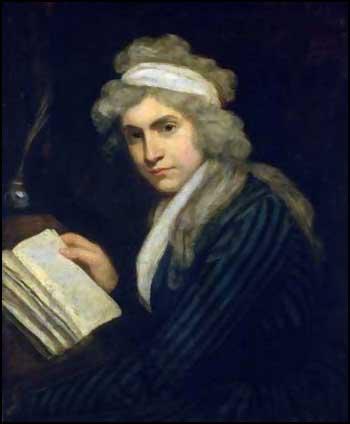
18 December 1790: The second edition of A Vindication of the Rights of Man is published with Mary Wollstonecraft name printed on the title page.
7 January 1792: Mary Wollstonecraft's Vindication of the Rights of Women is published.
17 May 1792: The birth of Annabella Milbanke (later Lady Byron) supporter of the Co-operative Society and the Mechanics Institute. She was active in the anti-slavery movement and in June 1840 attended the World Anti-Slavery Convention held at Exeter Hall in London.
6 September 1795: The birth of Fanny Wright in Scotland. The author of Views of Society and Manners in America (1821). She visited New Harmony in Indiana, the socialist community established by Robert Owen and his son Robert Dale Owen. She was immediately converted to Owenism and decided to form her own co-operative community called Nashoba. Wright then bought slaves from neighbouring farmers, freed them, and gave them land on her settlement.
1800-1819
12 June 1802: The birth of feminist writer Harriet Martineau. In 1823 she published the important article On Female Education. Books by Martineau include: Illustrations of Political Economy (1832), Poor Laws and Paupers Illustrated (1834), Society in America (1837), The History of the Peace (1849) and Letters on the Laws of Man's Nature and Development (1851).
23 November 1805: Mary Seacole was born in Kingston, Jamaica. When her application to join Florence Nightingale's team of nurses was rejected, she travelled to the Crimea at her own expense. By the summer of 1855 "she was a familiar figure at the battlefront, riding forward with two mules in attendance, one carrying medicaments and the other food and wine."
5 January 1807: The birth of Elizabeth Pease, a Quaker and anti-slavery campaigner.
8 October 1807: The birth of Harriet Taylor Mill, philosopher, and co-author of The Subjection of Women (1869).
22 March 1808: The birth of Caroline Norton, woman's rights campaigner.
29 September 1810: The birth of Elizabeth Gaskell. A campaigner against poverty and the and the author of Mary Barton: A Tale of Manchester Life (1848) and North and South (1855).
8 September 1815: The birth of Priscilla McLaren. The founder in 1865 of the Edinburgh Society for Women's Suffrage. In 1870 McLaren joined with her sister-in-law, Ursula Bright, Josephine Butler and Elizabeth Wolstenholme-Elmy in forming the Ladies' National Association, an organisation that pressed for the repeal of the Contagious Diseases Acts. This legislation allowed policeman to arrest prostitutes in ports and army towns and bring them in to have compulsory checks for venereal disease. If the women were suffering from sexually transmitted diseases they were placed in a locked hospital until cured. It was claimed that this was the best way to protect men from infected women. Many of the women arrested were not prostitutes but they still were forced to go to the police station to undergo a humiliating medical examination.
14 July 1819: Female Reformers of Blackburn have a letter demanding "annual parliament, universal suffrage, and election by ballot" published in the Black Dwarf newspaper.
20 July 1819: Mary Fildes established the Society of Female Reformers in Manchester.
16 August 1819: Mary Fildes is on the platform at St. Peter's Square, Manchester (Peterloo Massacre) waiting to make a speech on universal suffrage when the Manchester and Salford Yeomanry attempt to murder her.
29 December 1819: Mary Fildes has letter published in The Political Register where she praises William Cobbett defence of the Female Reformers of Manchester organisation.
1820-1829
20 January 1820: The birth of Anne Clough who in 1867 formed the North of England Council for Promoting the Higher Education of Women.
3 February 1820: The birth of Susanna Inge a member of the London Female Radical Association and one of the leaders of the Chartist movement.
12 May 1820: The birth of Florence Nightingale. She came from a staunch Unitarian family who believed in equal rights for women. Nightingale had a great desire to have a career in medicine and in 1851 went to Germany to train as a nurse.
3 February 1821: The birth of Elizabeth Blackwell in Bristol. The family emigrated to the United States and in 1849 she became the first woman to qualify as a doctor in the United States.
8 February 1822: Richard Carlile publishes an article in The Republican newspaper calling on women to join their voices with their husbands in "demanding a reformation in the system of government".
28 February 1822: Mary-Anne Carlile, the sister of Richard Carlile, petitioned the government over being imprisoned for selling The Republican.
10 May 1822: The Republican newspaper reports that Richard Carlile, Jane Carlile and Mary-Anne Carlile were sharing a prison room after being found guilty of publishing the work of Thomas Paine.
4 December 1822: The birth of Frances Power Cobbe. In her pamphlet, Criminals, Idiots, Women and Minors (1869), she argued that men made women economically dependent so that their authority would go unchallenged. Another pamphlet, Wife Torture in England, which proposed that wife assault should be made grounds for a legal separation, influenced the Matrimonial Causes Act of 1878 which gave a wife the right to a separation with maintenance, and with custody of any child under ten years of age.
24 February 1827: The birth of Lydia Becker who in 1881 became secretary of the Central Society for Women's Suffrage and in 1887 president of National Union of Women's Suffrage Societies.
8 April 1827: The birth of Barbara Bodichon, women's suffragist campaigner and the author of Brief Summary in Plain Language of the Most Important Laws Concerning Women (1854) and Women and Work (1857).
16 August 1827: The birth of Frances Mary Buss, who in 1850 established the North London Collegiate School for Girls.
13 April 1828: The birth of Josephine Butler, women's rights advocate, the author of The Education and Employment of Women (1868) and Women's Work and Women's Culture (1869) and campaigner against the Contagious Diseases Acts.
17 January 1829: The birth of Catherine Booth, co-founder of the Salvation Army and outstanding public preacher.
16 June 1829: The birth of Bessie Rayner Parkes. In 1846 Parkes met Barbara Bodichon, who was running a progressive school in London. The two women wrote several pamphlets on women's rights, including Remarks on the Education of Girls (1856). In 1858 they founded The Englishwoman's Review. Parkes continued to publish pamphlets and in Essays on Women's Work (1866) she argued that the laws of the country assumed that women were supported by their husbands or fathers, but with a shortage of men in the country, this was becoming less likely to happen. Parkes therefore suggested that it was necessary to improve the standard of education for girls.
1830-1839
22 April 1830: The birth of Emily Davies, the author of The Higher Education of Women (1864) and co-founder with Elizabeth Garrett Anderson, Barbara Bodichon, Dorothea Beale and Francis Mary Buss to form a woman's discussion group called the Kensington Society (1865) and the London Society for Women's Suffrage (1866).
21 March 1831: The birth of Dorothea Beale, women suffrage campaigner and head of Cheltenham Ladies College.
31 July 1831: The birth of Helen Taylor, a member of the Kensington Society that produced the first petition requesting votes for women. She was also the author of the The Ladies Petition (1967) and The Claims of Englishwomen to the Suffrage Constitutionally Considered (1867).
18 October 1831: The death of Elizabeth Coltman Heyrick, a member of the Anti-Slavery Society and the author of Immediate not Gradual Abolition (1824).
21 July 1832: The Poor Man's Guardian report on the formation of "The Female Society: The Friends of the Oppressed" in London to "assist and protect the wives and children of those who suffer in the people's cause".
3 August 1832: Henry ‘Orator' Hunt presents the first ever women's suffrage petition to Parliament.
27 October 1832: Eliza Sharples writes article calling for the repeal of taxes on knowledge.
26 November 1832: The birth of Mary Walker, campaigner for women's suffrage.
8 August 1833: 150 "Female Volunteers in Birmingham" send a letter of support to Richard Carlile campaign for press freedom.
15 December 1833: The birth of Elizabeth Wolstenholme-Elmy. In 1865 she helped form the Manchester Schoolmistresses' Association. In 1867 Wolstenholme-Elmy and Josephine Butler helped establish the North of England Council for the Higher Education of Women. This organisation provided lectures and examinations for women who wanted to become schoolteachers.
5 July 1835: The birth of Ursula Bright. On 30 October 1868, the Manchester National Society for Women's Suffrage established an executive committee that included Lydia Becker, Elizabeth Wolstenholme-Elmy, Jacob Bright and Josephine Butler..
29 May 1836: The Satirist journal attempts to damage the campaign of Caroline Norton for access to her children by claiming that she is having an affair with Lord Melbourne.
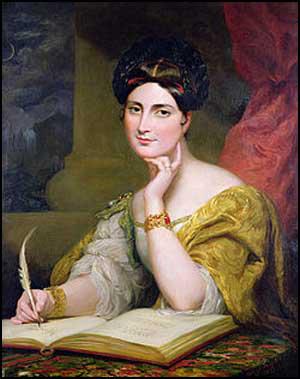
9 June 1836: The birth of Elizabeth Garrett Anderson. A suffragist in 1866 she established a dispensary for women in London and four years later was appointed a visiting physician to the East London Hospital. Determined to obtain a medical degree and after learning French, went to the University of Paris where she sat and passed the required examinations. However, the British Medical Register refused to recognize her MD degree.
17 February 1838: The Leeds Times reports that Elizabeth Hanson speech in favour of universal suffrage "melted the hearts and drew forth floods of tears".
2 February 1839: Female Political Union of Newcastle, published a statement on women's rights: "We have been told that the province of women is her home, and that the field of politics should be left to men; this we deny. It is not true that the interests of our fathers, husbands, and brothers, ought to be ours? If they are oppressed and impoverished, do we not share those evils with them? If so, ought we not to resent the infliction of those wrongs upon them? We have read the records of the past, and our hearts have responded to the historian's praise of those women, who struggled against tyranny and urged their countrymen to be free or die."
27 April 1839: The Northern Star reports that the Hyde Chartist Society contained 300 men and 200 women. The newspaper quoted one of the male members as saying that the women were more militant than the men.
18 July 1839: John Copley, 1st Baron Lyndhurst, made a speech in the House of Lords in support of Caroline Norton and the Custody of Children Act: "By the law of England, as it now stood, the father had an absolute right to the custody of his children, and to take them from the mother. However pure might be the conduct of the mother - however amiable, however correct in all the relations of life, the father might, if he thought proper, exclude her from all access to the children, and might do this from the most corrupt motives. He might be a man of the most profligate habits; for the purpose of extorting money, or in order to induce her to concede to his profligate conduct, he might exclude her from all access to their common children, and the course of law would afford her no redress: That was the state of the law."
1840-1849
21 January 1840: The birth of Sophia Jex-Blake who published a pamphlet, Medicine as a Profession for Women (1869), where she argued the case for women doctors. In 1887 she joined forces with Elizabeth Garrett Anderson to establish the Edinburgh School of Medicine for Women.
23 May 1840: Margaret Chapellsmith, a follower of Robert Owen, gives a lecture on "The Marriage System Proposed by the Socialists" at the Odd Fellow's Hall in Barnsley.
29 May 1840: Emma Martin argues at a public meeting in Northampton that if women had a good standard of education, it would benefit men.
12 June 1840: Annabella Byron, Amelia Opie, Mary Anne Rawson, Anne Knight and Elizabeth Pease. attend the World Anti-Slavery Convention held at Exeter Hall in London. The women were officially banned from this meeting and had to sit in the spectators' gallery.
17 January 1841: Emma Martin starts a series of three lectures in Macclesfield entitled: "Religion of the New Moral World"; "The Doctrine of Responsibility" and "The Marriage System".
7 March 1842: Feargus O'Connor, the leader of the Physical Force Chartists, upsets women in the movement when he says he is against women having equal political rights with men. He said that the role of the woman was to be a "housewife to prepare meals, to wash, to brew, and look after my comforts, and the education of my children."
25 May 1842: The birth of Helen Blackburn was born. A leading figure in the Central Society for Women's Suffrage she was the author of The Condition of Working Women (1896) and Women's Suffrage: A Record of the Women's Suffrage Movement in the British Isles (1902).
2 July 1842: Susanna Inge argues in The Northern Star that women should "assist those men who will, nay, who do, place women in on equality with themselves in gaining their rights, and yours will be gained also".
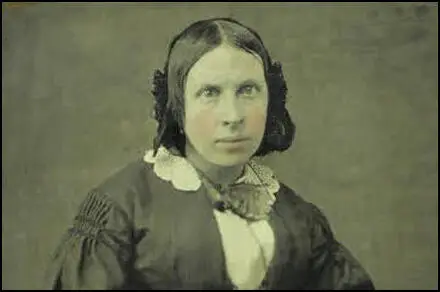
29 September 1842: Elizabeth Pease wrote: "The grand principle of the natural equality of man - a principle alas almost buried, in the land, beneath the rubbish of an hereditary aristocracy and the force of a state religion. Working people are driven almost to desperation by those who consider they are but chattels made to minister to their luxury and add to their wealth."
6 November 1842: The Sunday Observer reported that Susanna Inge was giving a lecture at the National Charter Hall in London attacking the arrest and punishment of John Frost after the Newport Uprising.
19 November 1842: Susanna Inge argues that women need "to be better educated, and that, if she were, so far as mental capacity, she would in every respect be the equal of man".
18 April 1844: The birth of Lilias Ashworth Hallett. Executive committee of the National Union of Women's Suffrage Societies, vice-president of the Central Society for Women's Suffrage and a financial supporter of the Women's Social and Political Union.
15 June 1844: The birth of Charlotte Despard. After the death of her husband in 1890 she decided as a socialist to devote all her energies in helping the poor. In 1894 Despard was elected as a Poor Law Guardian in Lambeth. She was also a member of the Social Democratic Federation, the Independent Labour Party, National Union of Women's Suffrage Societies, Women's Social and Political Union and the Women's Freedom League.
1 September 1844: Emma Martin gives a lecture on feminism in Preston.
22 June 1846: The birth of Matilda Chaplin Ayrton. In 1871 Chaplin took high honours in anatomy and surgery at the extramural examinations of the Royal College of Physicians and Surgeons of Edinburgh. Unable to become a doctor in the UK she obtained a MD in Paris and became a licentiate of the King and Queen's College of Physicians in Ireland in 1880.
3 November 1846: The birth of Elizabeth Thompson (Lady Butler). An artist that pioneered a completely new approach to military paintings.
11 June 1847: The birth of Millicent Garrett Fawcett. In 1871 she went on speaking tours on behalf of the women's movement. Her most popular lecture, "Electoral Disabilities of Women" attempted to deal with all the main objections to women having the vote. In 1897 she became president of the National Union of Women's Suffrage Societies.
1 October 1847: The birth of women's rights and trade union campaigner Annie Besant.
1850-1859
9 February 1850: Anne Knight criticised male Chartists for claiming "that the class struggle took precedence over that for women's rights" and that they should campaign for what she described as "true universal suffrage".
13 August 1850: Anne Knight argues that "taxation without representation is tyranny".
8 October 1851: The death of socialist, atheist and feminist lecturer, Emma Martin. In the early 1840s Martin attracted audiences of over 3,000 people.
20 December 1851: The birth of Dora Montefiore. A member of the Social Democratic Federation, National Union of Women's Suffrage Societies, Women's Social and Political Union, Women's Freedom League, Adult Suffrage Society and the Communist Party of Great Britain.
11 January 1852: The death of Elizabeth Sharples, journalist and lecturer, who campaigned for women's rights.
27 July 1853: The birth of Clementina Black, secretary of the Women's Trade Union Association, co-founder of the Consumers' League (an organisation that tried to cajole customers to put pressure on employers who paid very low wages to women) and the Women's Industrial Council.
22 August 1853: Florence Nightingale took the post of superintendent at the Institute for the Care of Sick Gentlewomen in Upper Harley Street, London.
2 December 1853: The birth of Alice Stewart Ker, a Women's Social and Political Union activist who went to prison in 1912 and became very ill after being force-fed while on hunger-strike.
28 April 1854: The birth of Hertha Ayrton a member of the Central Society for Suffrage, London National Society for Women's Suffrage, the National Union of Women's Suffrage Societies, the Women's Social and Political Union, the Jewish League for Woman Suffrage and the United Suffragists.
21 October 1854: Florence Nightingale and the staff of 38 women volunteer nurses are sent to help British forces in the Crimean War.
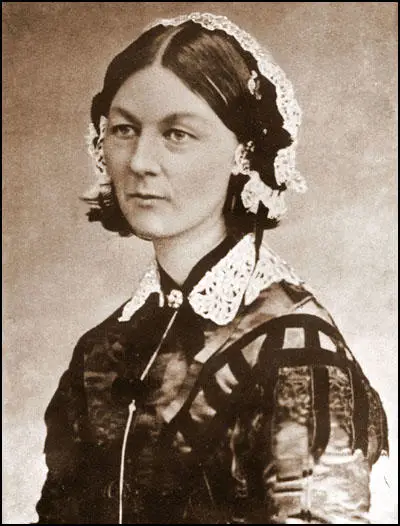
16 January 1855: The birth of Eleanor Marx, trade unionist and campaigner for women's rights.
17 April 1855: The birth of Florence Haig, a member of the Women's Social and Political Union.
20 May 1855: The birth of Alfred Pearse, who produced cartoons for The Vote, Votes for Women and The Suffragette.
23 May 1855: The birth of Isabella Ford. A suffragist, trade union and socialist activist who established the Leeds Tailoresses' Union in 1899. A member of the executive committee of the Independent Labour Party she was the author of Women's Wages (1893), Industrial Women (1900) and Women and Socialism (1904).
25 May 1855: The birth of Florence Dixie. A member of the National Union of Women's Suffrage Societies in 1895 became president of the British Ladies Football Club.
25 May 1855: The birth of Mary Postlethwaite, active member of the Women's Social and Political Union.
2 June 1855: Caroline Norton writes a letter to Queen Victoria on women's rights: "An English wife cannot legally claim her own earnings. Whether wages for manual labour, or payment for intellectual exertion, whether she weed potatoes, or keep a school, her salary is the husband's; and he could compel a second payment, and treat the first as void, if paid to the wife without his sanction."
27 September 1855: William H. Russell publishes article in the The Times about Mary Seacole during the Crimean War: "Mrs. Seacole is from Kingston (Jamaica) and she doctors and cures all manner of men with extraordinary success."
26 August 1856: The Times reports on the appearance of Mary Seacole at the Royal Guards Regimental Dinner: "Among the visitors was Mrs Seacole, whose appearance awakened the most rapturous enthusiasm."
30 December 1856: The birth of Mary Lowndes, a member of the National Union of Women's Suffrage Societies and Artists' Suffrage League.
28 August 1857: The birth of Alice Chapin, a member of the Women's Freedom League.
1 January 1858: After a long campaign by Caroline Norton, the Divorce and Matrimonial Causes Act 1857 comes into effect.
11 January 1858: The birth of Margaret Nevinson, a member of the National Union of Women's Suffrage Societies, Church League for Women's Suffrage, Women's Writers Suffrage League, the Women's Social and Political Union, and the Women's Freedom League.
22 April 1858: The birth of Ethel Smyth, a member of Women's Social and Political Union and the composer of its battle song, The March of the Women (1911).
22 January 1858: The birth of Beatrice Webb, sociologist, economist, socialist, labour historian and social reformer.
15 July 1858: The birth of Emmeline Pankhurst. The founder of the Women's Social and Political Union (1903) and The Women's Party (1917).
15 August 1858: The birth of Edith Nesbit political activist and the author of The Railway Children (1906), The Enchanted Castle (1907) and Ballads and Lyrics of Socialism (1908).
25 March 1859: Rachel McMillan, suffragist and author of Education Through the Imagination (1904) and The Economic Aspects of Child Labour and Education (1905). . In 1914 she joined with her sister Margaret McMillan and established the Open-Air Nursery School & Training Centre in Deptford.
30 April 1859: The birth of Marie Corbett, founder member of the founded the Women's Liberal Federation (1892) and the first woman to be elected to the Uckfield Board of Guardians and the Uckfield District Council.
1860-1869
9 April 1860: The birth of Emily Hobhouse, the woman who exposed the concentration camp scandal in South Africa and the founder of the Relief Fund for South African Women and Children in 1900.
5 June 1860: The birth of Mary Neal joined with Emmeline Pethick in 1895 to form the feminist Espérance Club that was influenced by the ideas of William Morris, Edward Carpenter and Walt Whitman.
20 July 1860: The birth of Margaret McMillan, suffragist and Christian Socialist, and author of Child Labour and the Half Time System (1896), Early Childhood (1900), Education Through the Imagination (1904), The Economic Aspects of Child Labour and Education (1905), The Child and the State (1911) and The Nursery School (1919).
25 November 1860: The birth of Emily Duval, suffragist and the mother of Victor Duval, Elsie Duval and Barbara Duval.
9 February 1861: The birth of Ada Wright one of the women badly beaten badly by the police at the Women's Social and Political Union demonstration on 18 November 1910.
16 October 1861: The birth of Francis Vane, a strong supporter of women's suffrage.
23 November 1861: The birth of Clemence Housman a member of the Women's Social and Political Union, Suffrage Atelier and the Women's Tax Resistance League.
3 February 1862: Birth of Mabel Stobart. A supporter of women's suffrage in 1914 she formed the Women's National Service League. This included women doctors, trained nurses, cooks, interpreters, and all workers essential for the independent working of a hospital of war.
6 August 1862: The birth of Elizabeth Robins. Co-founder of Women's Writers Suffrage League and the Actresses' Franchise League. One of the most important Women's Social and Political Union orators. When the British government introduced the Cat & Mouse Act in 1913, Robins used her 15th century farmhouse at Backsettown, near Henfield, that she shared with Octavia Wilberforce, as a retreat for suffragettes recovering from hunger strike.
1 May 1863: The birth of Florence Canning. An active member of the Women's Social and Political Union and the Church League for Suffrage.
16 August 1863: The birth of Sarah Carwin. A nurse who was a member of the Women's Social and Political Union who served several terms of imprisonment for breaking-windows.
24 August 1863: The birth of May Sinclair, a member of the Women's Writers Suffrage League and the author of Feminism (1912).
5 September 1863: The birth of Evelyn Haig, a member of the Women's Social and Political Union.
24 January 1864: The birth of Beatrice Harraden a member of the Women's Social and Political Union, Women's Writers Suffrage League and Women's Tax Resistance League.
30 January 1864: Birth of Helena Swanwick, a member of the National Union of Women's Suffrage Societies and editor of its weekly journal, The Common Cause (1909-1912) and author of The Future of the Women's Movement (1913).
7 May 1864: The birth of Catherine Pine. In 1909 she was involved with Flora Murray and Louisa Garrett Anderson in running the Notting Hill nursing home that Women's Social and Political Union members went to while recovering from hunger strikes. In 1912 the three women established the Women's Hospital for Children in the Harrow Road.
16 August 1864: The birth of Elsie Inglis who after attending the Edinburgh School of Medicine for Women was appointed lecturer in gynecology at the Medical College for Women. Inglis, an active member of the suffrage movement, also opened a small hospital for women in Edinburgh. In 1914 Inglis established the Scottish Women's Hospitals for Foreign Service.
20 November 1864: The birth of Minnie Baldock, a full-time organiser of the Women's Social and Political Union, who later resigned over its arson campaign.
4 December 1864: The birth of Selina Cooper. A member of the Cotton Worker's Union, Women's Co-operative Guild, the Independent Labour Party and North of England Society for Women's Suffrage. In 1901 she became the first working-class woman to be elected as a Poor Law Guardian.
22 December 1864: The birth of Marion Wallace-Dunlop. A member of the Women's Social and Political Union who in July 1909, became the first woman to go on hunger-strike in prison.
12 September 1865: The birth of Mary Bateson. A supporter of women's suffrage in 1889 she was appointed as a lecturer on English constitutional history at Newnham College. She served on the college council and took part in the unsuccessful effort of 1895–7 to have women admitted to full membership of the University of Cambridge.
28 September 1865: Elizabeth Garrett Anderson became the first English woman to officially qualify as a doctor.
21 November 1865: The Kensington Society discussed the topic of parliamentary reform for the first time.
24 December 1865: The birth of Maud Pember. In 1909 as a member of the Fabian Women's Group she began a four-year study of the daily lives of working-class families in Lambeth. The report was published as Round About a Pound a Week (1912). She wrote: "If people living on £1 a week had lively imaginations, their lives, and perhaps the face of England, would be different."
27 January 1866: The birth of Alice Wheeldon, a member of the Women's Social and Political Union and the No-Conscription Fellowship who was framed and imprisoned for an assassination plot against David Lloyd George.
19 April 1866: Dorothea Beale gives evidence before the schools inquiry commission (the Taunton commission) where she advocates equal funding for girl's education.
6 May 1866: The birth of Minnie Baldock, a member of the Women's Liberal Federation, National Union of Women's Suffrage Societies, Women's Social and Political Union and the Women's Tax Resistance League.
7 June 1866: John Stuart Mill presents the Kensington Society petition signed by 1,500 women householders to the House of Commons asking for the vote.
20 July 1866: The birth of Ada Salter, Quaker, suffragist, socialist and peace campaigner.
2 January 1867: The birth of Henria Williams, who died after being badly beaten by police after a Women's Social and Political Union demonstration on 18 November 1910.
13 April 1867: The birth of Emma Sproson, a member of the Women's Social and Political Union and the Women's Freedom League she became the first woman councillor in Wolverhampton and in 1922 she attempted to expose corruption by arguing that "fellow councillors were charging £5 expenses for a trip to London which she said only cost her 30 shillings".
20 May 1867: John Stuart Mill proposed in the House of Commons that women should be granted the same rights as men. "We talk of political revolutions, but we do not sufficiently attend to the fact that there has taken place around us a silent domestic revolution: women and men are, for the first time in history, really each other's companions."
9 August 1867: The birth of Eveline Haverfield, a member of the of the National Union of Women's Suffrage Societies, Women's Social and Political Union, Women's Tax Resistance League and East London Federation of Suffragettes who was imprisoned several times for her militant activities.
18 September 1867: The birth of Alice Margaret Cooke, the first recipient of a master's degree from Owens College in 1890.
25 September 1867: The birth of Katharine Glasier, women's rights campaigner and journalist who edited The Labour Leader (1916-1922) the newspaper of the Independent Labour Party.
21 October 1867: The birth of Emmeline Pethick-Lawrence, a member of the Independent Labour Party, Women's Social and Political Union and the Women's Freedom League.
4 February 1868: The birth of Constance Markievicz. After the passing of the passing of the 1918 Qualification of Women Act, Constance, while in prison, stood as the Sinn Fein candidate for the St. Patrick's division of Dublin. She was the only woman who was successful in the 1918 General Election.
4 April 1868: The birth of Philippa Garrett Fawcett. In June 1890 she became the first woman to score the highest mark of all the candidates for the Mathematical Tripos at the University of Cambridge.
15 April 1868: The Manchester National Society for Women's Suffrage holds the first ever public meeting about women's suffrage at the Manchester Free Trade Hall.
4 August 1868: The birth of Esther Roper. In 1903 Esther and Eva Gore-Booth established the Lancashire and Cheshire Women's Textile and Other Workers Representation Committee. That year they also they organized a suffrage petition with 30,000 signatures.
30 October 1868: The Manchester National Society for Women's Suffrage established a new executive committee that included Lydia Becker, Elizabeth Wolstenholme-Elmy, Ursula Bright, Jacob Bright and Josephine Butler
18 January 1869: The birth of Constance Lytton. A member of the Women's Social and Political Union she served several terms in prison and endured force-feeding, that contributed to an early death.
31 January 1869: Birth of Violet Douglas-Pennant, the first commander of the Women's Royal Air Force (1918).
8 May 1869: Birth of Flora Murray. In 1909 she was involved with Catherine Pine and Louisa Garrett Anderson in running the Notting Hill nursing home that Women's Social and Political Union members went to while recovering from hunger strikes. In 1912 the three women established the Women's Hospital for Children in the Harrow Road.
4 August 1869: The birth of Evelyn Sharp. Women's suffrage campaigner who worked as a journalist for the Manchester Guardian and the Daily Chronicle. An active member of the Women Writers Suffrage League she was the author of Rebel Women (1910) and Unfinished Adventure (1933).
7 August 1869: The birth of Dora Meeson Coates, an important creator of posters advocating women's suffrage.
31 August 1869: Elizabeth Knight leading member of the Women's Freedom League and the Women's Tax Resistance League and financial supporter of The Vote was born.
16 October 1869: Girton College is founded, becoming England's first residential college for women. The money was raised by two leaders of the feminist movement, Emily Davies and Barbara Bodichon.
9 December 1869: The birth of Edith Craig. A member of the Women's Social and Political Union and the co-founder of the Actresses' Franchise League. In 1911 Craig established the Pioneer Players. Under her leadership this society became internationally known for promoting women's work in the theatre.
1870-1879
28 January 1870: The birth of Ada Nield Chew. A member of the Independent Labour Party, in 1900 she worked for the Women's Trade Union League. She was also active in the National Union of Women's Suffrage Societies and the Women's International League for Peace and Freedom.
26 March 1870: Helen Taylor makes powerful speech on parliamentary reform at a meeting of the London Society for Women's Suffrage.
22 May 1870: The birth of Eva Gore-Booth. In 1903 Eva and Esther Roper established the Lancashire and Cheshire Women's Textile and Other Workers Representation Committee. That year they also they organized a suffrage petition with 30,000 signatures. Eva also co-edited the Women's Labour News, a quarterly journal aimed at uniting women workers.
9 August 1870: The 1870 Education Act receives royal assent. This act allows women to vote and serve on School Boards. Four women, Elizabeth Garrett, Lydia Becker, Emily Davies and Flora Stevenson were elected to local School Boards. Elizabeth Garrett, a popular local doctor, obtained more votes in Marylebone than any other candidate in the country.
9 August 1870: 1870 Married Women's Property Act was passed by Parliament.
17 February 1871: The birth of Julia Scurr. In 1907 she became a member of to the Board of Guardians that ran the Poplar Workhouse in London. In 1913, Sylvia Pankhurst, with the help of Julia Scurr, established the East London Federation of Suffragettes (ELF).
12 March 1871: The birth of Kitty Marion, a member of the Women's Social and Political Union who endured 232 force-feedings in prison while on hunger strike.
19 May 1871: The birth of Mabel Tuke. An active member of the Women's Social and Political Union who because of her poor health was only able to serve one term in prison.
12 August 1871: The birth of Susan Lawrence. A member of the Women's Trade Union League and the Labour MP for East Ham North.
15 August 1871: The birth of Ada Flatman. An active member of the National Union of Women's Suffrage Societies and the Women's Social and Political Union.
17 January 1872: First meeting of the Central Committee for Women's Suffrage. Women attending include Frances Power Cobbe, Agnes Garrett, Lilias Ashworth Hallett, Millicent Garrett Fawcett, Florence Nightingale and Harriet Martineau.
11 February 1872: The birth of Hannah Mitchell, an active member of the Women's Social and Political Union and the Women's Freedom League.
12 May 1872: The birth of Eleanor Rathbone. In 1919 she replaced Millicent Garrett Fawcett as president of the National Union of Women's Suffrage Societies. She was also the author of The Condition of Widows under the Poor Law (1913) and Equal Pay and the Family. A Proposal for the National Endowment of Motherhood (1917) where she argued for the introduction of family allowances.
13 June 1872: The birth of Chrystal Macmillan. A member of the National Union of Women's Suffrage Societies, she was the author of The Struggle for Political Liberty (1909) and later a successful a barrister (1924-1937).
15 June 1872: The birth of Cicely Hamilton. A founder of the Actresses' Franchise League and the Women's Writers Suffrage League she wrote two propaganda plays, How the Vote was Won (1909) and A Pageant of Great Women. She also joined with the composer, Ethel Smythe, to write March of the Women.
11 October 1872: The birth of Emily Wilding Davison, a Women's Social and Political Union activist who gave her life for the cause of women's suffrage.
25 October 1872: The birth of Mary Sheepshanks, principal of Morley College for Working Men and Women and member of National Union of Women's Suffrage Societies and the Women's International League for Peace and Freedom.
29 October 1872: The birth of Marion Phillips, member of the Independent Labour Party, the National Union of Women's Suffrage Societies, the Women's Labour League and the Labour Party MP for Sunderland.
17 March 1873: The birth of Margaret Bondfield, member of the Women's Industrial Council and Adult Suffrage Society, Labour Party MP and the first ever woman cabinet minister (8 June 1929).
25 July 1873: The birth of the historian Barbara Hammond who co-wrote The Village Labourer (1911), The Town Labourer (1917), The Skilled Labourer (1919), Lord Shaftesbury (1923), The Rise of Modern History (1925), The Age of the Chartists (1930) and The Bleak Age (1934).
25 October 1873: The birth of Patricia Woodlock, the Independent Labour Party and the Women's Social and Political Union, imprisoned seven times for suffrage activities.
22 March 1874: The birth of Norah Smyth, member of the Women's Social and Political Union and the East London Federation of Suffragettes.
6 November 1874: The birth of Katharine Stewart-Murray. Conservative Party MP who was deselected because she opposed appeasement.
12 November 1874: The birth of Rachel Barrett, a senior figure in the Women's Social and Political Union who was found guilty in 1913 of conspiracy to commit acts of arson.
31 May 1875: The birth of May Billinghurst. A healthy child at birth but when she was five months old, she suffered an illness which left her whole body paralysed, and although she regained the use of her hands and arms she would never walk unaided. This did not stop her becoming an active member of the Women's Social and Political Union and had several spells in prison where she was forced-fed.
17 June 1875: The birth of Edith How-Martyn. A member of the Women's Social and Political Union she was arrested in 1906 for trying to make a speech in the lobby of the House of Commons and was one of the first members of the organisation to be sent to prison. In October 1907, How-Martyn, Teresa Billington-Greig, Charlotte Despard and seventy other women formed the Women's Freedom League.
23 November 1875: The birth of Katharine Furse. On the outbreak of the First World War she was chosen to head the first Voluntary Aid Detachment unit to be sent to France. By 1916 she was appointed Commander-in-Chief and the following year became one of the five women appointed Dame Grand Cross, a newly created Order of the British Empire. In November 1917, Furse appointed as Director of the Women's Royal Naval Service (WRNS).
3 April 1876: The death of woman's rights campaigner, Mary Fildes.
19 July 1876: The birth of Hilda Burkitt, a member of the Young Hot Bloods, who committed several acts of arson.
8 August 1876: The birth of Sophia Duleep Singh, an Indian princess who was an active member of the Women's Social and Political Union and Women's Tax Resistance League.
15 August 1876: The birth of Ada Flatman, a member of the National Union of Women's Suffrage Societies and the Women Social & Political Union.
1 September 1876: The birth of Harriet Shaw Weaver. A member of the Women Social & Political Union and the main financial backer of the New Freewoman (June 1913 - November 1913).
15 October 1876: The birth of Teresa Billington-Greig, member of the Women's Social and Political Union and founder of the Women's Freedom League.
23 November 1876: The birth of Maude Royden. A member of the National Union of Women's Suffrage Societies and co-founder of the Church League for Suffrage. Royden also edited its newspaper, The Common Cause (1913-1914).
25 January 1877: The birth of Lilian Dove-Wilcox, a member of the Women's Social and Political Union who went on hunger-strike while in prison.
17 March 1877: The birth of Edith New, a member of the Women's Social and Political Union who was imprisoned several times for her activities.
18 June 1877: Annie Besant appears in court charged under the 1857 Obscene Publications Act (Besant had published The Fruits of Philosophy, a book about birth-control.
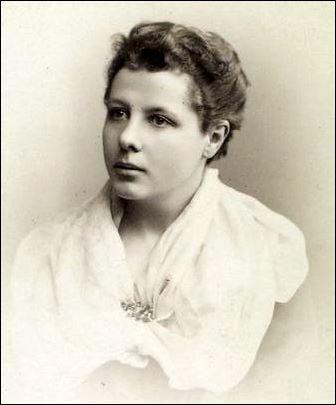
22 June 1877: The jury decide in the case against Annie Besant and Charles Bradlaugh about the publication of The Fruits of Philosophy. "We are unanimously of opinion that the book in question is calculated to deprave public morals, but at the same time we entirely exonerate the defendants from any corrupt motives in publishing it."
9 November 1877: The birth of Helen Crawfurd, one of the leaders of the Women's Social and Political Union who served several terms in prison for women's suffrage activities.
15 December 1877: The birth of Gladys Evans. A member of the Young Hot Bloods who took part in the Women's Social and Political Union arson campaign.
6 January 1878: The birth of twins, Marian Ellis and Edith Ellis, who later became Quaker peace campaigners.
6 February 1878: The birth of Hilda Dallas. A supporter of women's suffrage she designed several posters for the Women's Social and Political Union.
11 March 1878: The birth of Kathleen Courtney, honorary secretary of the National Union of Women's Suffrage Societies, and a member of the Women's International League for Peace and Freedom.
12 March 1878: The birth of Mary Allen, a member of the Women's Social and Political Union and co-founder of the Women Police Volunteers (September 1914), commander of the Women Police Service (February 1920) and Chief Women's Officer of the British Union of Fascists (October 1932).
25 May 1878: The birth of Catherine Courtauld a member of the Central Society for Women's Suffrage and the Suffrage Atelier.
4 August 1878: The birth of Flora Drummond. In 1906 Drummond joined Annie Kenney, Mary Gawthorpe, Nellie Martel, Helen Fraser, Adela Pankhurst and Minnie Baldock as Women's Social and Political Union full-time organizers. In 1908 she was put in charge of the WSPU offices at Clement's Inn.
21 January 1879: The birth of Helen Gwynne-Vaughan, the first commander of the Women's Auxiliary Army Corps (WAAC) during the First World War.
1 February 1879: The birth of Mary Blathwayt. Along with her mother Emily Blathwayt she joined the Women's Social and Political Union. Her father, Colonel Linley Blathwayt built a summer-house in the grounds of the estate that was called the "Suffragette Rest". Members of the WSPU who endured hunger strikes went to stay at Eagle House. In 1909 Colonel Blathwayt also created a suffragette arboretum in a field adjacent to the house. The idea was for women to be invited to plant a tree to commemorate their prison sentences and hunger strikes.
13 September 1879: The birth of Annie Kenney one of the most important figures in the Women's Social and Political Union. In 1913 she was sentenced to eighteen months for conspiracy to commit arson.
1880-1889
15 October 1880: The birth of Marie Stopes, a member of the Women's Freedom League and the author of books on equality in marriage (Married Love) and birth control (Wise Parenthood).
29 April 1880: The birth of Catherine Marshall, member of the London Society for Women's Suffrage, the National Union of Women's Suffrage Societies, the Women's International League for Peace and Freedom and the No-Conscription Fellowship.
15 July 1880: The birth of Mary Phillips, a member of the Women's Social and Political Union who suffered serious health problems after being imprisoned and forced-fed several times.
12 August 1880: The birth of Radclyffe Hall, author of the novel, The Well of Loneliness (1928) about lesbianism, that was banned by the authorities.
13 August 1880: The birth of Mary Macarthur, major figure in the Women's Trade Union League, Anti-Sweating League and People's Suffrage Federation.
22 September 1880: The birth of Christabel Pankhurst, co-founder of the Women's Social and Political Union and the leader of the Young Hot Bloods.
7 November 1880: Queen Victoria makes it clear to Prime Minister William Gladstone that she is against women's suffrage.
20 December 1880: The birth of Olive Hockin. A member of the Young Hot Bloods who took part in the WSPU arson campaign.
12 January 1881: The birth of Mary Gawthorpe. One of the main speakers at Women's Social and Political Union public meetings. Gawthorpe was also the co-editor of the Freewoman.
4 April 1881: The birth of Eileen Casey, a Women's Social and Political Union member who took part in the arson campaign.
29 August 1881: The birth of Vera Holme, Women's Social and Political Union member who was Emmeline Pankhurst's chauffeur. During the First World War she was in the Scottish Women's Hospital Unit sent to Serbia.
8 September 1881: The birth of Ethel Annakin Snowden. A member of the executive committee of the National Union of Women's Suffrage Societies she was the author of The Woman Socialist (1907), and The Feminist Movement (1913).
25 January 1882: The birth of Virginia Woolf, a member of the Adult Suffrage Society, and the author of The Voyage Out (1915), Jacob's Room (1922), Mrs Dalloway (1925), To the Lighthouse (1927), Orlando (1928), A Room of One's Own (1929) and The Waves (1931).
5 March 1882: The birth of Dora Marsden, a member of the Women's Social and Political Union and the Women's Freedom League and editor of The Freewoman (November 1911 - October 1912) and the New Freewoman (June 1913 – November 1913).
19 April 1882: The birth of Margery Corbett Ashby, member of National Union of Women's Suffrage Societies, the International Woman Suffrage Alliance and the National Union of Societies for Equal Citizenship.
5 May 1882: The birth of Sylvia Pankhurst, the co-founder of the Women's Social and Political Union and the main figure behind its arson campaign.
8 July 1882: The birth of Mary Agnes Hamilton, a member of the National Union of Women's Suffrage Societies, who became a Labour Party MP for Blackburn in 1929.
15 December 1883: The birth of Zeli Emerson, an important member of East London Federation of Suffragettes.
14 December 1882: The birth of Helena Normanton. A member of the Women's Freedom League she wrote several pamphlets on the issue of women's pay. In Sex Differentiation in Salary (1914) she argued for equal pay for equal work. After passing her exams she was called to the bar on 17th November 1922, a few months after Ivy Williams, had become the first woman to do so (but she did not practise).
12 June 1883: Birth of Margaret Haig Thomas (Lady Rhondda). A member of the Women's Social and Political Union she founded the feminist political magazine Time and Tide in 1920. The following year she launched the Six Point Group of Great Britain.
17 July 1883: At a meeting of the National Liberal Federation the 2,000 delegates passed a resolution that stated that: "any measure for the extension of the suffrage should confer the franchise on women, who, possessing the qualifications which entitle men to vote."
31 March 1884: The birth of Kathlyn Oliver, suffragist who became general secretary of the Domestic Workers' Union of Great Britain in 1910.
26 June 1884: The birth of Rona Robinson. She studied at Owens College and in 1905 she became the first woman in the United Kingdom to gain a first-class degree in chemistry. As a member of the Women's Social and Political Union she served several terms of imprisonment.
19 June 1884: The birth of Alison Neilans, a member of the Women's Freedom League.
17 August 1884: The birth of Dorothy Jewson. A member of the Women's Social and Political Union who in 1923 was elected as the Labour Party MP for Norwich. In her maiden speech, she advocated bringing down the voting age of women to twenty-one.
1 December 1884: The birth of Elsie Howey, a leading figure in the Women's Social and Political Union who served several terms in prison.
19 June 1885: The birth of Adela Pankhurst, the youngest daughter of and Emmeline Pankhurst. She joined the Women's Social and Political Union and was sent to prison several times for disrupting meetings held by Winston Churchill.
1 August 1885: The birth of Grace Roe, senior figure in the Women's Social and Political Union.
9 August 1885: The birth of Cicely Corbett Fisher. A member of the National Union of Women's Suffrage Societies and the International Woman Suffrage Alliance who worked for the Women's Industrial Council.
14 April 1886: Leah Manning, Labour MP for East Islington and a campaigner for the Republican government during the Spanish Civil War.
29 September 1886: The birth of Olive Wharry and a member of the Young Hot Bloods who was involved in the WSPU arson campaign.
27 November 1886: Beatrice Webb writes about Annie Besant: "She was the only woman I have ever known who is a real orator, who has the gift of public persuasion."
3 March 1887: The birth of Charlotte Marsh, a member of the Women's Social and Political Union, who was fed by tube 139 times in prison.
1 April 1887: The birth of Jessie Kenney, an important figure in the organisation of the Women's Social and Political Union.
22 May 1887: The birth of Clara Giveen, a member of the WSPU Young Hot Bloods group who committed acts of arson.
4 June 1887: The birth of Rachel (Ray) Strachey, leading figure in the National Union of Women's Suffrage Societies, the editor of The Common Cause and the author of Women's Suffrage and Women's Service (1928), The Cause: A Short History of the Women's Movement in Great Britain (1928) and Millicent Garrett Fawcett (1931).
8 January 1888: The birth of Octavia Wilberforce, a member of the Women's Social and Political Union who as a doctor looked after released hunger strikers at her home in Henfield and one of the main figures behind the opening of the New Sussex Hospital for Women in Brighton.
30 March 1888: The birth of Grace Jardine. A member of the Women's Social and Political Union and the Women's Freedom League and editor of The Freewoman (November 1911 - October 1912) and the New Freewoman (June 1913 - November 1913).
23 June 1888: Annie Besant writes an article entitled White Slavery in London, complaining about the way the women at Bryant & May were being treated. The company reacted by attempting to force their workers to sign a statement that they were happy with their working conditions. When a group of women refused to sign, the organisers of the group was sacked. The response was immediate; 1400 of the women at Bryant & May went on strike.
23 June 1888: The birth of Mabel Capper. Along with Patricia Woodlock she helped organize a series of public demonstrations at Manchester parks in favour of votes for women.
24 November 1888: The birth of Helen Craggs, a member of the Young Hot Bloods who carried out acts of arson as part of the campaign to win the vote.
26 November 1888: Annie Besant, a member of the Fabian Society was elected to the London School Board in Tower Hamlets. After heading the poll with a fifteen thousand majority over the next candidate, Besant argued that she had been given a mandate for large-scale reform of local schools. Some of her many achievements included a programme of free meals for undernourished children and free medical examinations for all those in elementary schools.
8 March 1889: The birth of Lilla Brockway, a member of the National Union of Women's Suffrage Societies and co-founder of the No-Conscription Fellowship in 1914.
14 August 1889: Eleanor Marx, Rachel McMillan and Margaret McMillan helped organise the London Dock Strike.
18 December 1889: The birth of Elsie Bowerman. In 1908 Bowerman formed a branch of Women's Social and Political Union at Girton College. She became Christabel Pankhurst's agent when she represented the Women's Party in the 1918 General Election in Smethwick. In 1922 Bowerman and Flora Drummond established the Women's Guild of Empire, a right-wing league opposed to communism.
23 December 1889: The birth of Victoria Lidiard. A member of the Women's Social and Political Union who went to prison in March 1912 after breaking a window at the Home Office.
1890-1899
24 June 1890: Philippa Fawcett became the first woman to score the highest mark of all the candidates for the Mathematical Tripos at the University of Cambridge.
8 October 1891: The birth of Ellen Wilkinson, women's rights campaigner, was born
5 January 1891: The birth of Lilian Lenton, an active member of the Women's Social and Political Union, who endured several terms in prison and force-feedings.
19 July 1891: The birth of Florence Tunks, a member of the WSPU Young Hot Bloods who carried out acts of arson as part of the campaign to win the vote.
25 July 1891: The birth of Mary Stocks, a member of the National Union of Women's Suffrage Societies and National Union for Equal Citizenship.
4 August 1892: Elsie Inglis qualifies as a doctor in Edinburgh.
21 December 1892: The birth of Rebecca West. An early advocate of "free-love" she was the author of the novels Return of the Soldier (1918), The Judge (1922), The Strange Necessity (1928) and Harriet Hume (1929).
9 February 1893: The birth of Elsie Duval, a member of the Women's Social and Political Union and the Women's Freedom League.
14 March 1893: The birth of Vera Wentworth, a member of the Women's Social and Political Union who served several terms in prison.
19 April 1893: The birth of Jessie Stephen organiser of the Scottish Federation of Domestic Workers and member of the Women's Social and Political Union.
6 May 1893: The birth of Margaret Postgate Cole, the author of Guild Socialism Restated (1920), William Cobbett (1925) and Robert Owen (1925), The Condition of Britain (1937), The New Economic Revolution (1938) and Marriage Past and Present (1938), which outlined a theory of socialist feminism.
29 December 1893: The birth of Vera Brittain. Peace campaigner and the author of Women's Work in Modern Britain (1928), Halcyon or the Future of Monogamy (1929), Testament of Youth (1933), Testament of Experience (1957), Women at Oxford (1960), Pethick-Lawrence: a Portrait (1963), The Rebel Passion: a Short History of some Pioneer Peacemakers (1964) and Radclyffe Hall: a Case of Obscenity? (1968),
5 March 1894: The Local Government Act receives Royal Assent, which allows married and single women to vote in elections for county and borough councils.
23 March 1895: Nettie Honeyball, the founder of the British Ladies Football Club, organises the first official match played by women at Crouch End in London. The women were organized into teams that represented North and South London.
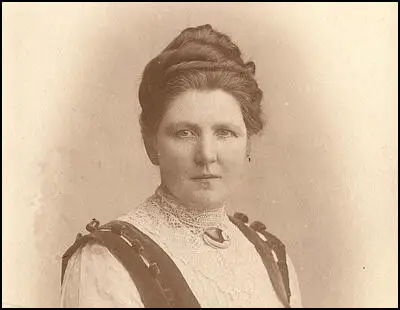
22 September 1896: Queen Victoria becomes the longest reigning monarch in British history (59 years).
14 October 1897: The London Society for Women's Suffrage, Manchester Society for Women's Suffrage, Liberal Women's Suffrage Society and the Central Committee for Women's Suffrage join together to form the National Union of Women's Suffrage Societies.
9 January 1899: The birth of Eileen Power, the ground-breaking historian who was the author of The Paycockes of Coggeshall (1919), Medieval English Nunneries (1922), Medieval People (1924), The Goodman of Paris (1928), Studies in English Trade in the 15th Century (1933), The Wool Trade in English Medieval History (1941) and Medieval Women (1975).
1900-1904
1 May 1900: Esther Roper and Eva Gore-Booth, at a public meeting of North of England Society in Blackburn, launch a petition for women's suffrage signed exclusively by women working in the Lancashire cotton mills.
27 February 1900: The Independent Labour Party, the Social Democratic Federation and the Fabian Society agree with trade union leaders to form the Labour Party. The new party adopts the policy of universal suffrage.
27 December 1900: Emily Hobhouse, founder of the Relief Fund for South African Women and Children arrives in Cape Town.
19 April 1901: Birth of Edith Summerskill, founder member of the Socialist Medical Association in 1930, Labour MP who was important in the passing of the 1964 Married Women's Property Act.
25 May 1901: Selina Cooper, the Independent Labour Party candidate, is elected to the Board of Burnley Poor Law Guardians. Although women had been allowed to stand as candidates since the passing of the Municipal Franchise Act in 1869, no working-class woman had ever been elected to one of these bodies.
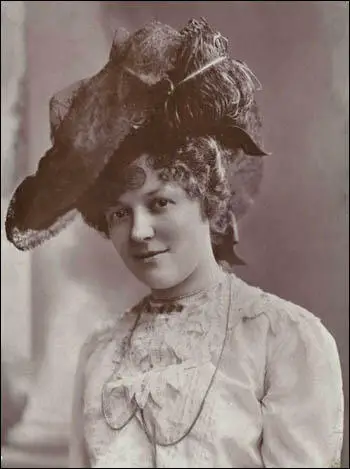
18 February 1902: The North of England Society present to Keir Hardie in the House of Commons a petition demanding women's suffrage signed by 37,000 women textile workers.
1 August 1902: David Shackleton with the canvasing support of local women textile wins the Clitheroe by-election. Shackleton promised to use his position in the House of Commons to argue for women's suffrage.
18 October 1902: John Bruce Glasier of the Independent Labour Party attacks Emmeline Pankhurst for wanting votes for women on the same terms as men, instead of arguing for universal suffrage.
18 July 1902: David Shackleton, the secretary of the Darwen Weavers, the Labour Party candidate for the Clitheroe by-election, pledged himself to seek the immediate enfranchisement of women on the same terms as men."
18 July 1903: Hannah Mitchell has a letter published in the Labour Leader, the newspaper of the Independent Labour Party, complaining about the dismissive attitude of male members towards women and suggesting that they should form their own political party.
21 August 1903: T. P. O'Connor writes about Annie Besant's public speaking skills. "What a beautiful and attractive and irresistible creature she was then with her slight but full and well-shaped figure, her dark hair, her finely chiselled features".
10 October 1903: The Women's Social and Political Union was founded by Emmeline Pankhurst. Important early members included Christabel Pankhurst, Sylvia Pankhurst, Adela Pankhurst, Emmeline Pethick-Lawrence, Marion Wallace-Dunlop, Elizabeth Robins, Flora Drummond, Annie Kenney, Mary Gawthorpe, May Billinghurst, Elizabeth Wolstenholme-Elmy, Mary Allen, Winifred Batho, Mary Leigh, Mary Richardson, Ethel Smyth, Teresa Billington-Greig, Helen Crawfurd, Eileen Casey, Emily Davison, Charlotte Despard, Mary Clarke, Margaret Haig Thomas, Cicely Hamilton, Florence Tunks, Hilda Burkitt, Clara Giveen, Eveline Haverfield, Edith How-Martyn, Constance Lytton, Kitty Marion, Helen Craggs, Ada Wright, Dora Marsden, Hannah Mitchell, Margaret Nevinson, Evelyn Sharp, Nellie Martel, Helen Fraser, Jennie Baines, Emma Sproson, Minnie Baldock and Octavia Wilberforce.
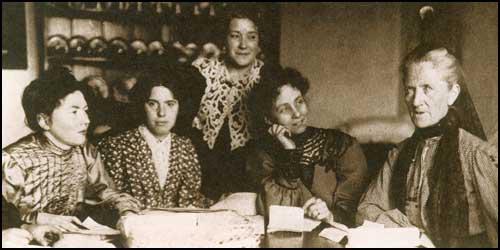
Nellie Martel, Emmeline Pankhurst and Charlotte Despard.
16 October 1903: Elizabeth Wolstenholme-Elmy organized the National Convention for the Civil Rights of Women held at the Holborn Town Hall. It was attended by 200 delegates.
9 March 1904: Selina Cooper and Hannah Mitchell open their campaign to be elected the Nelson Board of Guardians. They were both elected.
1 May 1904: Hannah Mitchell, the Independent Labour Party candidate is elected to the Ashton Board of Guardians. Mitchell's posters stated: "Out of 971 inmates of the workhouse, 371 are women, with 81 children. Show your sympathy with these by sending a woman to look after them. Vote for Mrs Mitchell: The Workers' Candidate."
3 November 1904: The birth of Jennie Lee who was first elected to the House of Commons in 1929 who was the minister behind the introduction of the Open University.
16 December 1904: The Clarion published a letter from Ada Nield Chew, attacking Women's Social and Political Union policy of votes for women on the same terms as men.
1905-1909
27 January 1905: Selina Cooper argues at the Labour Representation Committee conference at Liverpool that the leadership should fully support women's suffrage.
26 April 1905: The birth of Lily Parr, one of the greatest ever English football players who scored over 900 goals in her career.
13 October 1905: Christabel Pankhurst and Annie Kenney are arrested and accused of assaulting a police officer while attending a meeting in London where Sir Edward Grey, a minister in the British government, was speaking.
15 October 1905: Christabel Pankhurst and Annie Kenney were found guilty of assaulting a police officer and become the first people campaigning for women's suffrage to be sent to prison.
24 October 1906: Emmeline Pethick-Lawrence, Annie Kenney, Mary Gawthorpe, Dora Montefiore, Teresa Billington-Greig, Edith How-Martyn, Adela Pankhurst and Minnie Baldock are sent to prison for "using threatening and abuse words and behaviour with intent to provoke a breach of the peace" after trying to make speeches in the lobby of the House of Commons. Sylvia Pankhurst is sentenced to fourteen days in prison for making a disturbance in court.
27 October 1906: Millicent Garrett Fawcett of the National Union of Women's Suffrage Societies wrote an article in defence of militant suffragettes against what she called the "reptile" press.
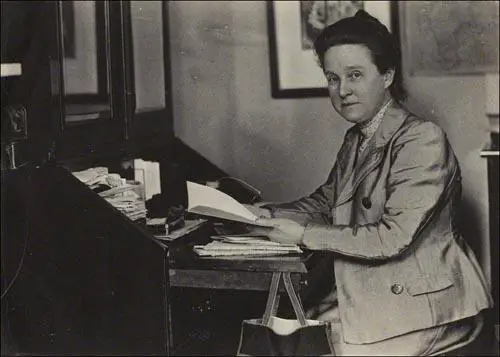
28 November 1906: Hannah Mitchell and other members of the Women's Social and Political Union manage to dramatically reduce the majority of the Liberal Party candidate, Arthur Sherwell, at the Huddersfield by-election, by campaigning for the Labour Party candidate.
11 December 1906: Millicent Garrett Fawcett, the leader of the National Union of Women's Suffrage Societies hosts a "Complimentary Banquet" at the Savoy Hotel for released Women's Social and Political Union prisoners.
13 December 1906: Jennie Baines was arrested during a Women's Social and Political Union protest demonstration and sentenced to 14 days in prison. She later said it was "an experience that reinforced her concern for the treatment of women prisoners, which left her, she said, more of a rebel than ever."
9 February 1907: National Union of Women's Suffrage Societies organise the United Procession of Women (Mud March) in which more than 3,000 women marched from Hyde Park Corner to the Strand in support of women's suffrage.
13 February 1907: The Women's Social and Political Union organized the first Women's Parliament at Caxton Hall. Fifty-eight women appeared in court because of the conflict, and several were sent to prison, including Emmeline Pankhurst, who is sentenced to six weeks.
20 February 1907: Liberal Party majority at the Aberdeen South by-election reduced from 4,000 to under 400. A WSPU campaign in support of the Independent Labour Party candidate organized by Helen Fraser and Adela Pankhurst was the major reason for this bad result for the government.
8 March 1907: The Women's Enfranchisement Bill (the Willoughby H Dickinson Bill) is introduced to parliament for its second reading but is talked out.
29 May 1907: Men's League For Women's Suffrage have their first official meeting in London.
3 September 1907: Emmeline Pankhurst makes speech calling on those Women's Social and Political Union members "who cannot follow the general must drop out of the ranks."
10 September 1907: Emmeline Pankhurst demands that the Women's Social and Political Union becomes a para-military organization.
10 September 1907: Charlotte Despard, Edith How-Martyn and Teresa Billington-Greig resign from the Women's Social and Political Union.
4 October 1907: The Women's Social and Political Union start publishing the Votes for Women newspaper.
10 November 1907: The Women's Freedom League is formed. A militant, but non-violent organisation.
17 December 1907: A large demonstration is held by the Men's League For Women's Suffrage in London.
17 January 1908: Edith New is arrested after chaining herself to the railings of 10 Downing Street.
21 April 1908: May Billinghurst was quoted by the Manchester Guardian as saying: "I feel that the present government is not acting in accordance with the first principles of Liberalism, by refusing the right of representation to women taxpayers. I have joined no other party and I still claim to be a Liberal woman but a Liberal woman on strike."
13 June 1908: Demonstration organised by the National Union of Women's Suffrage Societies intended to convince the new Liberal Party Prime Minister Herbert Asquith that there was mass support in the country for women's suffrage.
21 June 1908: The Women's Sunday march was organised by the Women's Social and Political Union to persuade the government to support votes for women. An estimated 500,000 women and men from all over the country attended the event. At the time, the largest protest to ever have taken place in Britain. Speakers included Emmeline Pankhurst, Christabel Pankhurst, Adela Pankhurst, Emmeline Pethick-Lawrence, Mary Gawthorpe, Jennie Baines, Rachel Barrett, Marie Brackenbury, Georgina Brackenbury, Annie Kenney, Nellie Martel, Marie Naylor, Flora Drummond, Edith New and Gladice Keevil.
30 June 1908: Over 5,000-foot police and 50 mounted men break-up Women's Social and Political Union deputation to Parliament. Mary Phillips, Jessie Kenney, Florence Canning, Florence Haig, Elsie Howey, Octavia Lewin, Edith New, Marion Wallace-Dunlop, Maud Joachim, Mary Leigh and Vera Wentworth were amongst those arrested.
1 July 1908: Twenty-seven members of the Women's Social and Political Union are sent to prison for terms varying from one to two months after taking part in a demonstration outside 10 Downing Street on 30 June 1908. Mary Phillips said "The Government has forced us to adopt tactics, and the Government is solely responsible."
16 July 1908: Muriel Matters and Violet Tillard are attacked by 30 youths in Hastings while on a Women's Freedom League caravan tour of Sussex.
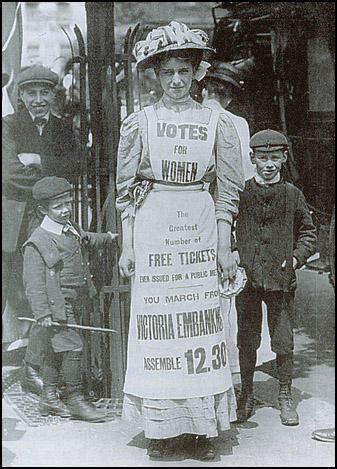
19 July 1908: Mabel Capper and Patricia Woodlock organise a demonstration held at Heaton Park, Manchester, on women's suffrage, that is attended by an estimated 50,000 people.
26 July 1908: A large public meeting is held in Leeds on woman's suffrage. Speakers include Emmeline Pankhurst, Annie Kenney, Mary Gawthorpe, Emmeline Pethick-Lawrence, Jennie Baines, Gladice Keevil, Adela Pankhurst and Flora Drummond.
23 August 1908: Mary Leigh and Edith New are released from prison and their carriage is pulled by Women's Social and Political Union members from Holloway to Queen's Hall.
11 October 1908: Cicely Hamilton and other authors establish the Women's Writers Suffrage League. Members included Beatrice Harraden, Elizabeth Robins, Charlotte Despard, Alice Meynell, May Sinclair, Olive Schreiner, Edith Ellis, Margaret Nevinson, Evelyn Sharp and Marie Belloc Lowndes.
13 October 1908: Members of the Women's Social and Political Union attempt to enter the House of Commons by force. Twenty-four women and twelve men were arrested including Emmeline Pankhurst, Christabel Pankhurst, Mabel Capper, Clara Codd, Helen Crawfurd, Ada Flatman, Marion Wallace-Dunlop, Grace Roe and Ada Wright.
28 October 1908: Women's Freedom League members, Muriel Matters and Violet Tillard, unfurl a banner from the Ladies' Gallery in the House of Commons. Matters chained herself to the grille covering the Ladies' Gallery window. "While attached to the grille Matters, by a legal technicality, was judged to be on the floor of Parliament and thus, the words spoken by her that day are still considered to be the first delivered by a woman in the House of Commons."
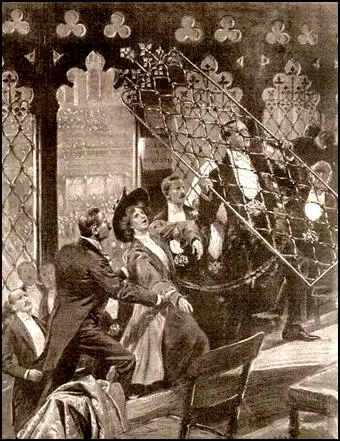
26 November 1908: The first meeting of the Actresses' Franchise League was held in London. Members included Cicely Hamilton, Elizabeth Robins, Kitty Marion, Winifred Mayo, Sime Seruya, Edith Craig, Inez Bensusan, Ellen Terry, Lillah McCarthy, Sybil Thorndike, Vera Holme, Lena Ashwell, Christabel Marshall, Lily Langtry and Nina Boucicault.
26 November 1908: Jennie Baines and Alfred Kitson (leader of the unemployed in Leeds) were arrested and charged with causing a riot. She was convicted of unlawful assembly outside the Coliseum in Leeds, she was sentenced to six weeks' imprisonment on refusing to be bound over because she did "not recognise the laws of this Court administered by men".
17 February 1909: Muriel Matters hired a pilot and an airship, which she had painted with the words "Votes for Women" in gigantic lettering. Armed with 56lb of Women's Freedom League pamphlets she flew from the Welsh Harp, Hendon, at heights of up to 3500 feet, with the intention of flying over Parliament.The weather conditions and a poor motor meant that Muriel didn't make it to Westminster, but she did fly over outer London for one and a half hours scattering leaflets as she went. Her exploit was a success as it created publicity for the suffrage movement generating headlines in newspapers around the world.
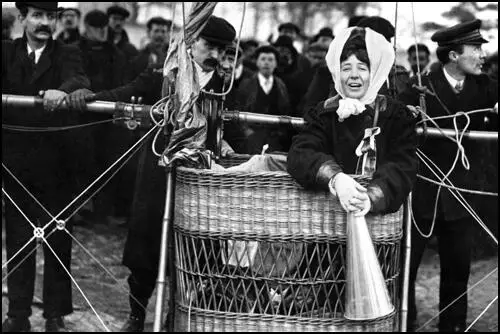
24 February 1909: Constance Lytton was arrested and imprisoned after taking part in a Women's Social and Political Union demonstration outside the House of Commons. When the authorities found out that she was the daughter of Lord Lytton, the former Viceroy of India, they ordered her release.
25 February 1909: Several members of the Women's Social and Political Union, including Mary Allen, Constance Lytton, Emmeline Pethick-Lawrence, Sarah Carwin and Caroline Watts are arrested for taking part in a demonstration outside the House of Commons.
26 March 1909: Mary Humphry Ward of the Anti-Suffrage League announced that over 250,000 people had signed the petition against women's suffrage.
30 March 1909: Dora Marsden, Rona Robinson and Mary Gawthorpe dressed in university gowns are arrested in a Women's Social and Political Union demonstration outside Winson Green Prison in Birmingham.
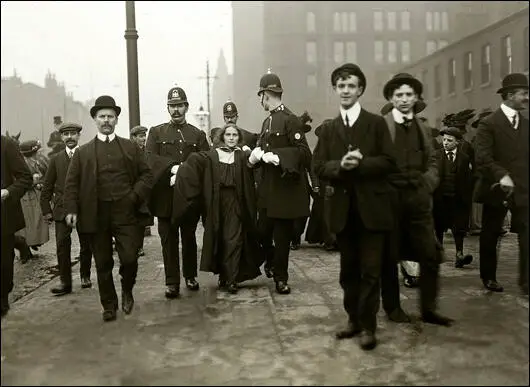
15 April 1909: The first edition of The Common Cause, edited by Helena Swanwick, is published by the National Union of Women's Suffrage Societies.
16 June 1909: Patricia Woodlock, the Women's Social and Political Union organiser in Liverpool, is released from prison after her three-month sentence for taking part in a demonstration at Caxton Hall. Woodlock was taken to the Inns of Court where Emmeline Pankhurst and Mary Gawthorpe gave speeches acknowledging her commitment to the cause.
19 June 1909: Emily Wilding Davison protests against forcible feeding by trying to commit suicide.
25 June 1909: Marion Wallace-Dunlop is found guilty of wilful damage and when she refused to pay a fine, she was sent to prison for a month.
29 June 1909: Sarah Carwin and Ada Wright were arrested for breaking government windows. They were sentenced to a month in prison. While in Holloway they broke every window in their cells as a protest. Both women were released after being on hunger strike for six days.
5 July 1909: Marion Wallace-Dunlop becomes the first member of the Women's Social and Political Union to go on hunger-strike.
21 July 1909: Jane Brailsford writes about joining the Women's Social and Political Union: "I have not before been in touch with a body of people so entirely selfless as the members of the Women's Social and Political Union. This absolute devotion to their cause, a devotion that stops at nothing and fears nothing - is acting like a magnet, drawing supporters slowly and steadily from all over the country. Nothing can stop this movement."
4 September 1909: Dora Marsden and Emily Wilding Davison are arrested for breaking windows of a hall in Old Trafford. Two days later they are both sentenced to two months' imprisonment in Strangeways.
17 September 1909: Laura Ainsworth, Charlotte Marsh, Mary Leigh and Patricia Woodlock climbed onto the roof of Bingley Hall in Birmingham.
17 September 1909: Keir Hardie has letter published in The Times complaining about the force-feeding of suffragettes: "Worn and weak by hunger-strike they are seized upon, held down by brute force, gagged and a tube inserted down the throat and food poured or pumped into the stomach. Let British men think over the spectacle."
20 September 1909: Women's Social and Political Union member Hilda Burkitt declared in an official petition to the Home Office that she was going on hunger-strike and that she was "ready to lay down my life, to bring about the Freedom of my Sex."
22 September 1909: Laura Ainsworth, Charlotte Marsh and Mary Leigh were arrested while disrupting a public meeting being held by Herbert Asquith. Marsh, Ainsworth and Leigh were all sentenced to two weeks' imprisonment. They immediately decided to go on hunger-strike.
22 October 1909: The Women's Tax Resistance League is established. It is a direct-action group of women who refused to pay taxes without political representation.
28 October 1909: At the Bermondsey by-election, Alison Neilans and Alice Chapin attacked polling stations, smashing bottles containing corrosive liquid over ballot boxes, in an attempt to destroy votes. The count was delayed while ballot papers were carefully examined, 83 ballot papers were damaged but legible but two ballot papers became undecipherable. Despite the actions of the two women it was decided the election was valid.
30 October 1909: The Women's Freedom League publish the first edition of The Vote.
13 November 1909: Theresa Garnett accosts Winston Churchill, the Home Secretary, with a whip.
2 December 1909: Inaugural meeting of the Church League for Women's Suffrage at St Mark's Church, Regent's Park.
4 December 1909: Dora Marsden is arrested for disrupting a meeting in Southport that was being addressed by Winston Churchill.
9 December 1909: Charlotte Marsh is released from prison after being fed by a stomach tube a total of 139 times.
1910-1914
13th January 1910: Victor Duval, formed the Men's Political Union for Women's Enfranchisement (MPU). Duval later explained that "The society was formed as a result of a growing conviction among men, as well as women, that the delay in removal of the sex disqualification from the Parliamentary franchise was due to the determined indifference of the Government rather than to any considerable opposition in the country." The MPU also provided protection for members of the Women's Social and Political Union during demonstrations.
18 January 1910: Henry N. Brailsford writes letter to Millicent Garrett Fawcett suggesting that he should attempt to establish a Conciliation Committee for Women's Suffrage.
22 April 1910: Colonel Linley Blathwayt create a suffragette arboretum in a field adjacent to Eagle House. Constance Lytton, Annie Kenney, Emmeline Pethick-Lawrence and Clara Codd, were all invited to tree planting ceremonies.
12 July 1910: The Conciliation Bill, designed to conciliate the suffragist movement by giving a limited number of women the vote, according to their property holdings and marital status was carried by 109 votes and it was agreed to send it away to be amended by a House of Commons committee.
5 September 1910: Jessie Kenney, Vera Wentworth and Elsie Howey, assault the Prime Minister Herbert Asquith while attending a church service.
15 October 1910: Eva Gore-Booth explains in The Vote newspaper why "women are much worse paid then men".
18 November 1910: 300 Women's Social and Political Union members protest in the House of Commons about the government's decision to drop the Conciliation Bill. Women are beaten by the police and this results in the deaths of Cecilia Wolseley Haig and Henria Williams.
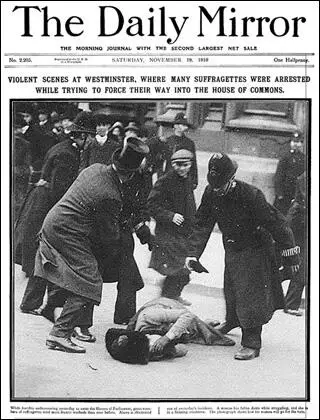
18 November 1910: Eveline Haverfield was charged with assaulting a policeman by hitting him in the mouth. In court it was reported that Haverfield had said during the assault that she had not hit him hard enough and that "next time I will bring a revolver."
21 November 1910: Helen Craggs is arrested after disrupting a speech by David Lloyd George at the Paragon Theatre, Whitechapel.
27 January 1911: Dora Marsden and Grace Jardine resigned from the Women's Social and Political Union and joined the Women's Freedom League.
2 April 1911: Emily Wilding Davison avoids the census by hiding in a cupboard in the crypt at the House of Commons.
5 May 1911: The Conciliation Bill was passed by the House of Commons by a majority of 167. Several members of the government, including Winston Churchill, the Home Secretary, voted against it.
6 May 1911: Herbert Asquith announced that in the next session of Parliament he would introduce a Bill to enfranchise the four million men currently excluded from voting and suggested it could be amended to include women.
17 June 1911: Edith Downing and Marion Wallace-Dunlop organised the Woman's Coronation Procession. An estimated 40,000 women took part and organisations involved included the Women Social & Political Union (WSPU), the National Union of Women's Suffrage Societies (NUWSS), Women's Freedom League (WFL), Church League for Suffrage, Actresses' Franchise League, Artists' Suffrage League, Suffrage Atelier, Women's Tax Resistance League, Men's League For Women's Suffrage, Fabian Women's Group, Catholic Women's Suffrage Society and the Church Socialist League.
21 June 1911: On the eve of King George V's coronation, around 40,000 women from 28 suffrage societies march on London for female enfranchisement.
8 July 1911: The Vote reports that Emma Sproson of the Women's Freedom League and the Women's Tax Resistance League is sent to prison for the offence of keeping a dog without a licence.
30 September 1911: Clemence Housman is sent to prison for refusing to pay taxed inhabited house duty.
21 November 1911: The Women's Social and Political Union carried out an "official" window smash along Whitehall and Fleet Street resulting in the arrest of 160 suffragettes.
21 November 1911: Clara Giveen was sentenced to a week in Holloway Prison after being found guilty of holding the bridle of a policeman's horse at a Women's Social and Political Union protest.
23 November 1911: Dora Marsden, Grace Jardine and Mary Gawthorpe published the first edition of The Freewoman. The journal caused a storm when it advocated free love and encouraged women not to get married. The journal also included articles that suggested communal childcare and co-operative housekeeping.
23 November 1911: Rebecca West claims in an article: "Marriage had certain commercial advantages. By it the man secures the exclusive right to the woman's body and by it, the woman binds the man to support her during the rest of her life... a more disgraceful bargain was never struck."
24 November 1911: Henry Nevinson publishes an article in Votes for Women about the arrest of May Billinghurst: "Just at that time as I was returning to Whitehall I met Miss Billinghurst, that indomitable cripple, being carried shoulder high by four policemen in her little tricycle or wheel-cart that she propels with her arms. Amid immense cheering from the crowd she followed the rest into the police station."
31st November 1911: Death of Cecilia Wolseley Haig. It was argued that this was the result of being beaten by police on Black Friday.
28 December 1911: Dora Marsden argues in The Freewoman: "Monogamy was always based upon the intellectual apathy and insensitiveness of married women, who fulfilled their own ideal at the expense of the spinster and the prostitute… Indissoluble monogamy is blunderingly stupid, and reacts immorally, producing deceit, sensuality, vice, promiscuity and an unfair monopoly."
13 January 1912: Victor Duval (Men's Political Union for Women's Enfranchisement) and Una Dugdale (Women Social & Political Union) got married: It was announced that the word "obey" would be omitted from the marriage service at the Savoy Chapel. However, the Archbishop of Canterbury, sent his representative to tell the Rev. Hugh Chapman, that the omission would make the validity of the marriage doubtful. "The couple acquiesced, and the usual marriage ceremony was proceeded with."
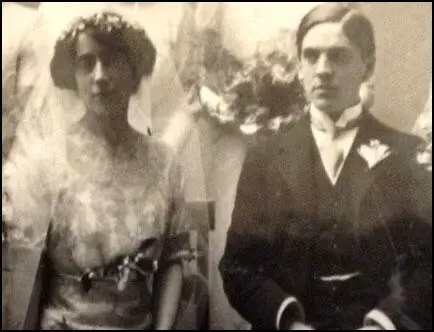
2 March 1912: The Manchester Guardian reported: "The madness of the militants… the small body of misguided women who profess to represent the noble and serious cause of political enfranchisement of women, but in fact do their utmost to degrade and hinder it."
4 March 1912: The Women's Social and Political Union organise a window-breaking demonstration in Whitehall. It involved over 150 women armed with hammers, stones and clubs simultaneously smashing the windows of shops and offices in London's West End.
7 March 1912: Dora Marsden writes in The Freewoman: "The Pankhurst party have lost their forthright desire for enfranchisement in their outbalancing desire to raise their own organisation to a position of dictatorship amongst all women's organisations.... The vote was only of secondary importance to the leaders... before every other consideration, political, social, or moral comes the aggrandisement of the WSPU itself and the increase of power of their own organisation."
21 March 1912: Stella Browne wrote an article on free-love in The Freewoman: "The sexual experience is the right of every human being not hopelessly afflicted in mind or body and should be entirely a matter of free choice and personal preference untainted by bargain or compulsion."
29 March 1912: The Parliamentary Franchise (Women) Bill was defeated by 208 to 222. Eight members of the Liberal Government voted against the Bill.
30 March 1912: Sarah Carwin, Ada Wright, Olive Wharry and Kitty Marion are sentenced to six months in Winson Green Prison for breaking windows in Regent Street.
16 April 1912: Elsie Inglis, secretary of the Scottish Federation of Women's Suffrage Societies delivers lecture on "Women's Suffrage and the Present Political Situation".
20 June 1912: Dora Marsden argues in The Freewoman that sexual equality will never be achieved under a capitalist system.
20 June 1912: Millicent Garrett Fawcett and the National Union of Women's Suffrage Societies took the decision to form an electoral alliance with the growing Labour Party, as the only political party which really supported women's suffrage. The first instance of this was at the Holmfirth by-election.
25 June 1912: Helen Craggs makes a protest demanding women's suffrage while King George V lays the foundation stone for the new National Museum of Wales in Cardiff.
13 July 1912: Helen Craggs fails in her attempt to burn down the country home of the colonial secretary Lewis Harcourt.
18 July 1912: Women's Social and Political Union member Mary Leigh hurled a hatchet at Herbert Asquith as he was travelling in an open carriage with John Redmond in Dublin. She missed him and hit Redmond on his ear.
18 July 1912: Mary Leigh and Gladys Evans attempt to set fire to the Theatre Royal in Dublin.
6 August 1912: Mary Leigh and Gladys Evans are sentenced to five years imprisonment for their attempt to set fire to the Theatre Royal in Dublin.
10 October 1912: The last edition of the feminist journal, The Freewoman, is published.
10 January 1913: May Billinghurst told the jury at the Old Bailey: "My heart ached and I thought surely if women were consulted in the management of the state happier and better conditions must exist for hard-working sweated lives such as these… It was gradually unfolded to me that the unequal laws which made women appear interior to men were the main cause of these evils. I found that the man-made laws of marriage, parentage and divorce placed women in every way in a condition of slavery - and were as harmful to men by giving them power to be tyrants…. The government authorities may further maim my body by the torture of forcible feeding as they are torturing weak women in prison at the present time. They may even kill me in the process for I am not strong, but they cannot take away my freedom of spirit or my determination to fight this good fight to the end."
6 February 1913: Zeli Emerson suffers a a fractured skull after being beaten-up by police at a women's suffrage meeting.
19 February 1913: Lilian Lenton and Olive Wharry are arrested and charged with setting fire to the tea pavilion in Kew Gardens.
19 February 1913: An attempt was made to blow up a house which was being built for David Lloyd George, the Chancellor of the Exchequer, near Walton Heath Golf Links. That evening in a speech at Cory Hall, Cardiff, Emmeline Pankhurst declared "we have blown up the Chancellor of Exchequer's house' and stated that "for all that has been done in the past I accept responsibility. I have advised, I have incited, I have conspired". Pankhurst concluded that extreme methods were needed because "No measure worth having has been won in any other way."
24 February 1913: Emmeline Pankhurst was arrested for procuring and inciting persons to commit offences contrary to the Malicious Injuries to Property Act 1861.
7 March 1913: Olive Wharry was found guilty of arson, and it was reported by the Daily Mirror that "Wharry laughed when sentenced to eighteen months' imprisonment.
10 March 1913: Alice Wheeldon and Winnie Mason are found guilty of conspiracy to murder David Lloyd George. Alice was sentenced to ten years in prison whereas Winnie received "five years' penal servitude. Both women had been framed.
3 April 1913: Elsie Duval was arrested over setting fire to Sanderstead Station.
3 April 1913: Emmeline Pankhurst is sentenced her to three years' penal servitude for procuring and inciting persons to commit acts of violence. Based on the speech she made on 19 February 1913 at Cory Hall, Cardiff.
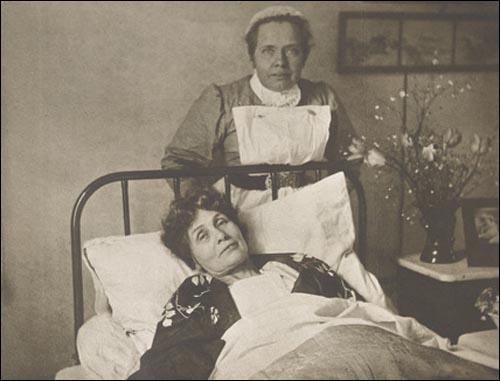
8 April 1913: Olive Wharry was released from prison after having been on hunger strike for 32 days. His usual weight was 7st 11lbs; when released she weighed 5st 9lbs.
25 April 1913: Prisoners Temporary Discharge for Ill Health (Cat and Mouse Act) becomes law.
26 April 1913: Kitty Marion sets fire to a train, left standing between Hampton Wick and Teddington.
30 April 1913: The police raided the Women's Social and Political Union's office at Lincoln's Inn House. As a result of the documents found several people were arrested including Rachel Barrett, Edwy Godwin Clayton, Flora Drummond, and Annie Kenney.
7 May 1913: Sylvia Pankhurst, Keir Hardie, Norah Smyth, Julia Scurr, Mary Phillips, Millie Lansbury, Eveline Haverfield, Lilian Dove-Wilcox, Maud Joachim, Nellie Cressall and George Lansbury, established the East London Federation of Suffragettes. An organisation that combined socialism with a demand for women's suffrage it worked closely with the Independent Labour Party. Pankhurst also began production of a weekly paper for working-class women called The Women's Dreadnought.
17 May 1913: Miriam Pratt sets fire to an empty building attached to the Balfour Biological Laboratory for Women, in Storey's Way, Cambridge, with a paraffin-soaked cloth.
4 June 1913: Emily Wilding Davison ran out on the course and attempted to grab the bridle of Anmer, a horse owned by King George V in the Epsom Derby.
6 June 1913: Helena Normanton writes a detailed article for The Vote newspaper on how the law discriminates against women.
9 June 1913: Kitty Marion and Clara Giveen set-fire to the grandstand at the Hurst Park racecourse as it "would make a most appropriate beacon".
18 June 1913: The National Union of Women's Suffrage Societies begin their Woman's Suffrage Pilgrimage to show Parliament how many women wanted the vote.
20 June 1913: Members of the Women's Social and Political Union, Edwy Godwin Clayton (21 months), Annie Kenney (18 months) and Rachel Barrett (6 months) were found guilty of conspiring to damage property.
10 July 1913: Kitty Marion and Clara Giveen were found guilty of arson and sentenced to three years' penal servitude. They both went on hunger strike and after five days were released under the Cat & Mouse Act.
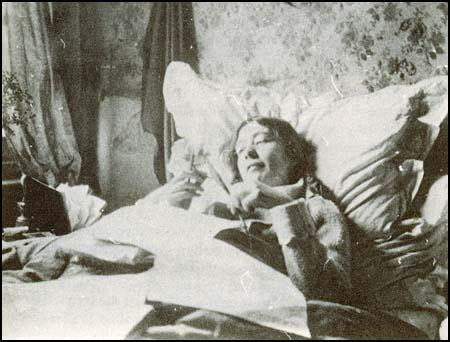
22 July 1913: Public meeting held by Marie Corbett and other members of the National Union of Women's Suffrage Societies in East Grinstead is broken up by youths in the pay of the Conservative Party. Several women are injured.
26 July 1913: An estimated 50,000 women reached Hyde Park at the end of the Woman's Suffrage Pilgrimage. Millicent Garrett Fawcett, the main speaker and she made it clear that she dissociated herself with the tactics of the Women's Social and Political Union.
29 July 1913: Millicent Garrett Fawcett writes to Herbert Asquith suggesting that the Women's Pilgrimage showed that the public was in favour of women's suffrage.
15 August 1913: Catherine Marshall and Kathleen Courtney urge the National Union of Women's Suffrage Societies to begin negotiations with the Labour Party as being the only political party which had women's suffrage in its programme.
18 October 1913: Miriam Pratt admits in court that she was guilty of arson: "I ask you to look again at what has been done and see in it not wilful and malicious damage, but a protest against a callous Government, indifferent to reasoned argument and the best interests of the country. A protest carried to extreme because no other means would avail... show by your verdict today that to fight in the cause of human freedom and human betterment is to do no wrong."
1 November 1913: Beatrice Webb publishes an article where she argues that the Women's Social and Political Union has been "transformed from a passively conservative into an actively revolutionary force".
5 November 1913: Sir Francis Vane offers to form a "People's Army" in order to defend women during demonstrations for women's suffrage.
5 November 1913: Zeli Emerson was badly beaten by police carrying clubs. Suffering from a fractured skull, she was carried away by sympathisers.
14 November 1913: The National Union of Women's Suffrage Societies makes statement in The Common Cause rejecting the use of violence in obtaining the vote for women.
25 November 1913: Women's Social and Political Union members Hilda Burkitt and Clara Giveen are arrested for attempting to set fire to the grandstand at the Headingly Football Ground.
22 December 1913: Lilian Lenton is charged with setting fire to a house in Cheltenham.
30 December 1913: Sophia Duleep Singh is taken to court over her refusal to pay taxes.
6 January 1914: Bailiffs arrive at the home of Sophia Duleep Singh, a member of Women's Tax Resistance League, and take away a necklace and gold bangle to pay her tax debts.
9 January 1914: The United Suffragists produced its first party manifesto. Barbara Ayrton Gould became its first secretary and the committee had equal numbers of men and women.
13 January 1914: Beatrice Harraden of the Women's Social and Political Union, writes a letter to Christabel Pankhurst accusing her of alienating too many old colleagues by her dictatorial behaviour
29 January 1914: Christabel Pankhurst expelled Sylvia Pankhurst and Adela Pankhurst from the Women's Social and Political Union for refusing to follow orders.
2 February 1914: Dora Marsden criticised Christabel Pankhurst for upholding the values of chastity, marriage, and monogamy.
6 February 1914: A group of supporters of women's suffrage, who were disillusioned by the lack of success of the National Union of Women's Suffrage Societies and disapproved of the arson campaign of the Women's Social and Political Union, decided to form the United Suffragists movement.
7 February 1914: East London Federation of Suffragettes is expelled from the Women's Social and Political Union after Christabel Pankhurst claims that they are too concerned with other causes – such as living and working conditions.
17 February 1914: East London Federation of Suffragettes hold large public meeting outside Bromley Public Hall. During the meeting someone threw a stone at a nearby undertaker's window. Sylvia Pankhurst and Zeli Emerson are arrested and taken to Bow police station. They were sentenced to two months' hard labour for causing malicious damage to a £3 plate-glass window.
20 February 1914: The Common Cause reports that an electoral alliance between the National Union of Women's Suffrage Societies and the Labour Party had been agreed.
8 March 1914: The Woman's Dreadnought is published for the first time.
10 March 1914: Mary Richardson attacked a painting, Rokeby Venus by Diego Velázquez, at the National Gallery.
14 March 1914: Sylvia Pankhurst publishes the first edition of The Women's Dreadnought.
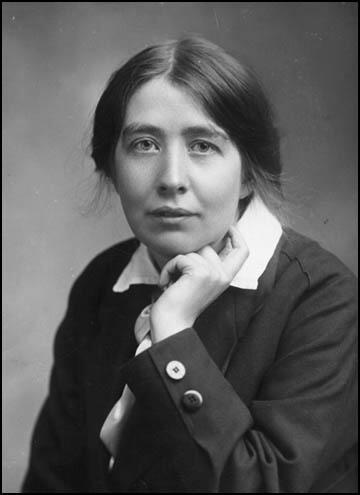
27 March 1914: Eva Gore-Booth writes article for Votes for Women entitled "Equal Pay for Equal Work".
17 April 1914: Hilda Burkitt and Florence Tunks set fire to the Britannia Pavilion on the pier in Great Yarmouth. A postcard was found on the sands with comments about Reginald McKenna, the Home Secretary: "Mr McKenna has nearly killed Mrs Pankhurst. We can show no mercy until women are enfranchised."
18 April 1914: Hilda Burkitt and Florence Tunks set fire to the Bath Hotel in Felixstowe, causing £35,000 damage (estimated to be the equivalent of £2.6m today).
8 May 1914: Lilian Lenton is found guilty of attempted arson and was sentenced to 12 months imprisonment.
12 May 1914: Lilian Lenton was released from Armley Gaol under the Cat & Mouse Act.
15 May 1914: Eva Gore-Booth publishes article in Votes for Women criticising the budget for cutting the taxes of rich men while disadvantaging widows.
29 May 1914: Hilda Burkitt was sentenced to two years' imprisonment, and Florence Tunks to nine months for several cases of arson including setting fire to the Bath Hotel in Felixstowe, on 28 April.
31 May 1914: Kitty Marion escaped to Paris. She had endured 232 force-feedings in prison while on hunger strike.
23 July 1914: The Church Times was highly critical of the Church League for Suffrage and reported: "For any sane person the thing is so absolutely grotesque that he must refuse to discuss it. The monstrous regiment of women in politics would be bad enough but the monstrous regiment of priestesses would be a thousandfold worse."
1 August 1914: Millicent Garrett Fawcett issued a statement on behalf of the International Woman Suffrage Alliance representing 26 countries. "We, the women of the world, view with apprehension and dismay the present situation in Europe, which threatens to involve one continent, if not the whole world, in the disasters and horrors of war."
10 August 1914: After secret negotiations the government announced it was releasing all suffragettes from prison. In return, the Women's Social and Political Union agreed to end their militant activities and help the war effort.
10 August 1914: Olive Wharry was released from prison after having been on hunger strike. According to one newspaper her eyes were "sunken", her face was pale, her tongue was "blistered and coated" and she spoke with "much difficulty and pain".
1 September 1914: The International Manifesto of Women is published.
4 September 1914: Christabel Pankhurst announces the end of the Women's Social and Political Union campaign for women's suffrage.
9 September 1914: Christabel Pankhurst argues that Women's Social and Political Union members should stop campaigning for the vote and instead concentrate on defeating Germany.
1915-1919
6 February 1915: Ten members of the National Executive of the National Union of Women's Suffrage Societies resigned over the decision not to support the Women's Peace Congress at the Hague. This included Chrystal Macmillan, Margaret Ashton, Kathleen Courtney, Catherine Marshall, Eleanor Rathbone and Maude Royden.
12 February 1915: Millicent Garrett Fawcett writes in The Common Cause: "The more pacifist we have been, the more we must declare today that the war should go on right to the end… the more pacifist we are, the more we must insist now on crushing, not Germany, but German militarism."
12 March 1915: Isabella Ford publishes an article in the Leeds Weekly Citizen attacking the National Union of Women's Suffrage Societies policy of support for the First World War. Ford believed that women's groups should use all their efforts to obtain a negotiated peace.
28 April 1915: International Congress of Women meet at the Hague. 190 women applied for permission, but the government cancelled their passports and the only British women able to attend and only Chrystal Macmillan, Kathleen Courtney and Emmeline Pethick-Lawrence were able to travel to the Hague. The conference culminated in the creation of various anti-war projects such as the Women's International League for Peace and Freedom.
15 October 1915: The Women's Social and Political Union changed its newspaper's name from The Suffragette to Britannia.
11 March 1916: East London Federation of Suffragettes changes its name to the Workers' Suffrage Federation.
10 June 1916: Women's Peace Crusade is founded in opposition to the First World War. Members include Charlotte Despard, Selina Cooper, Margaret Bondfield, Ethel Snowden, Katherine Glasier, Helen Crawfurd, Eva Gore-Booth, Esther Roper, Teresa Billington-Greig, Elizabeth How-Martyn, Dora Marsden, Helena Normanton, Margaret Nevinson, Hanna Sheehy-Skeffington and Mary Barbour.
31 January 1917: Alice Wheeldon, Hettie Wheeldon, Winnie Maso, former members of the Women's Social and Political Union and current members of the No-Conscription Fellowship are arrested and charged with plotting to murder the British Prime Minister David Lloyd George and Arthur Henderson, the leader of the Labour Party.
15 February 1917: The Manchester Guardian reports on the activities of the Church League for Suffrage and that "The Church League for Women's Suffrage is now committed to women-preachers and women in Holy Orders… This has led to several important Churchwomen leaving an organisation which has been captured for so outrageous an attack upon the Church."
7 March 1917: Katherine Harley, a member of the National Union of Women's Suffrage Societies and the Church League for Suffrage, was killed while serving with the Scottish Women's Hospital Unit during the First World War.
28 March 1917: The House of Commons voted 341 to 62 that women over the age of 30 who were householders, the wives of householders, occupiers of property with an annual rent of £5 or graduates of British universities.
16 July 1917: Maude Royden, said in a sermon at the City Temple, the Congregational church in Holborn: "The Church should go forward along the path of progress and be no longer satisfied only to represent the Conservative Party at prayer."
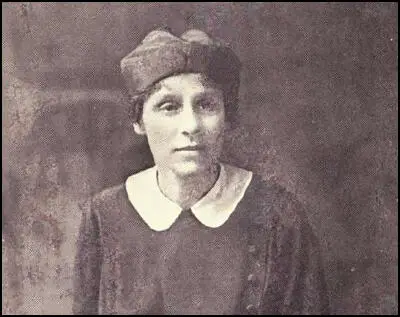
28 July 1917: Sylvia Pankhurst publishes the first edition of The Workers' Dreadnought.
2 November 1917: The Women's Social and Political Union is renamed the Women's Party.
6 February 1918: Qualification of Women Act becomes law.
18 April 1918: The Bishop of London bans Maude Royden from preaching on Good Friday on the grounds that this was an especially "sacred" service. Soon afterwards, the Church League for Suffrage, resolved to campaign not only for the right to preach but the priesthood of women.
14 December 1918: Constance Markievicz, the Sinn Féin Party, was elected for the constituency of Dublin St Patrick's, beating her opponent William Field with 66% of the vote. She was the only woman who was successful in the 1918 General Election. However, like the other 72 Sinn Fein MPs, she did not attend the House of Commons in London.
14 December 1918: Mary Macarthur, the Labour Party candidate in Stourbridge is defeated in the 1918 General Election.
14 December 1918: Emmeline Pankhurst representing the Women's Party in Smethwick with the support of the Conservative Party, lost by only 778 votes to her only opponent, the Labour Party's John Davison.
6 February 1919: The National Union of Women's Suffrage Societies became the National Union of Societies for Equal Citizenship (NUSEC).
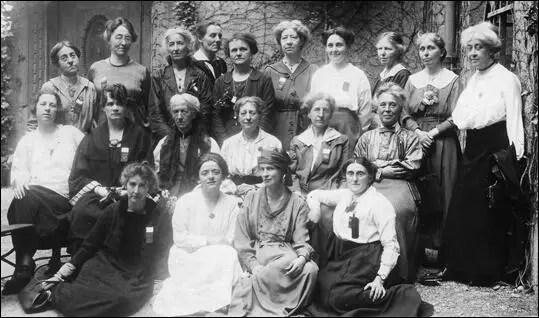
1 September 1919: Five women members of Poplar Council (Susan Lawrence, Millie Lansbury, Julia Scurr, Nellie Cressall and Jennie MacKay) are sent to Holloway Prison for setting a rate of 4s 4d instead of 6s 10d.
1920-1929
14 May 1920: Margaret Haig Thomas publishes the first edition of the feminist political magazine Time and Tide. The first editor of the magazine was Helen Archdale.
25 July 1920: The birth of Rosalind Franklin, the scientist who produced X-ray diffraction pictures of DNA in 1953, that played an important role in establishing the structure of DNA.
1 March 1921: Margaret Haig Thomas launched the Six Point Group of Great Britain, which focused on what she regarded as the six key issues for women: The six original specific aims were: (1) Satisfactory legislation on child assault; (2) Satisfactory legislation for the widowed mother; (3) Satisfactory legislation for the unmarried mother and her child; (4) Equal rights of guardianship for married parents; (5) Equal pay for teachers; (6) Equal opportunities for men and women in the civil service.
26 October 1921: Helena Normanton married Gavin Bowman Watson Clark but retained her maiden name. Normanton deplored the loss of a woman's identity on marriage and its disadvantageous legal results. Three years later she became the first married British woman to be issued a passport in her maiden name.
17 November 1922: Helena Normanton after passing her exams was called to the bar. This was a few months after Ivy Williams, had become the first woman to do so (but she did not practise).
4 February 1924: Helena Normanton becomes the first female counsel at the Old Bailey when she is appointed to defend a man charged with fraud.
16 July 1926: Rebecca West points out in Time and Tide: "Dora Marsden conceived the idea of starting The Freewoman because she was discontented with the limited scope of the suffragist movement. She felt that it was restricting itself too much to the one point of political enfranchisement and was not bothering about the wider issues of Feminism."
28 April 1928: The Daily Mail complained against the proposed 1928 Equal Franchise Act claiming that these impressionable young females would be easily manipulated by the Labour Party.
6th July 1928: The Women's Freedom League's newspaper, The Vote, comment on the passing of the 1928 Equal Franchise Act: "To have won equal voting rights for women and men is a great victory, but it will be an infinitely greater achievement when we have succeeded in abolishing for ever the 'woman's sphere', 'woman's work', and a 'woman's wage', and have decided that the whole wide world and all its opportunities is just as much the sphere of women, as of men."
19 August 1928: The Sunday Express argues that Radclyffe Hall's novel, The Well of Loneliness, about lesbianism, should be banned. "In order to prevent the contamination and corruption of English fiction it is the duty of the critic to make it impossible for any other novelist to repeat this outrage. I say deliberately that this novel is not fit to be sold by any bookseller or to be borrowed from any library."
30 May 1929: At the 1929 General Election several women representing the Labour Party including Cynthia Mosley, Marion Phillips, Susan Lawrence, Edith Picton-Turbervill, Margaret Bondfield, Ethel Bentham, Ellen Wilkinson, Mary Hamilton and Jennie Lee were all elected to the House of Commons.
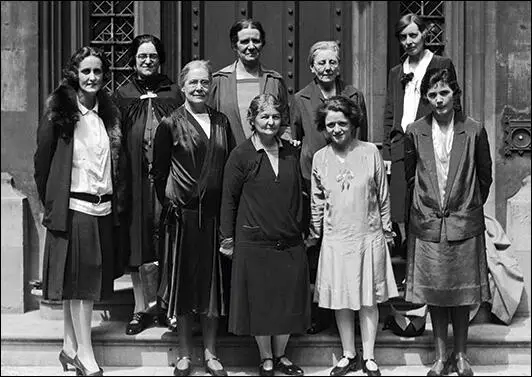
Cynthia Mosley, Marion Phillips, Susan Lawrence, Edith Picton-Turbervill,
Margaret Bondfield, Ethel Bentham, Ellen Wilkinson, Mary Hamilton and Jennie Lee.
8 June 1929: Margaret Bondfield becomes first woman cabinet minister (Minister of Labour).
3 August 1945: Clement Attlee, appointed Ellen Wilkinson as Minister of Education, the first woman in British history to hold the post.
30 October 1957: The government revealed plans to allow women to sit in the House of Lords.

